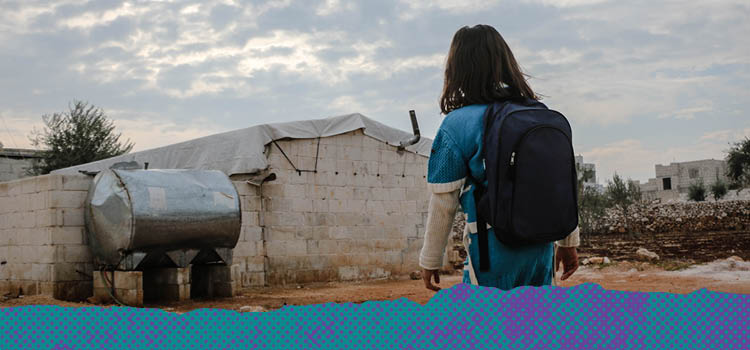You can’t miss the issue from the news: Of the tens of thousands of unaccompanied children who come into the US each year, 44% who appeared in immigration courts in Fiscal Year 2024 did not have legal representation, according to data from the Department of Justice. No matter their age, these children are expected to present their own cases for staying in the US, because the country does not give these children the right to appointed counsel. In Fiscal Year 2021, more than a quarter million unaccompanied children had pending immigration cases in the US.
Representation is crucial as children with legal representation at some point during their cases are seven times more likely to be able to stay in the US than children without legal assistance.
Lawyers in family or immigration law, those who are committed to social justice, those who yearn to try something different, as well as new lawyers, can make a difference for these children.

“Immigration lawyers truly are a lifeline,” said Lauren Esterle of the Acacia Center for Justice’s Attorney Recruitment Project, which works to build capacity in the field to reach its goal of universal representation. “We believe that all people facing deportation and detention should have access to meaningful, zealous, and person-centered representation by a trained attorney or legal advocate. Our work is only possible because of the amazing network of dedicated human rights defenders who show up every day to ensure immigrants have access to legal defense and a fair shot at justice.”
In this Q&A, Esterle explains more about the problem and how the Acacia Center for Justice can help lawyers change these children’s trajectories.
Who are unaccompanied children and why do they come to the US?
It’s important to remember that migration is a natural phenomenon that has long existed prior to the creation of modern border systems and will continue to exist in the future, including for children. Each year, thousands of children, often fleeing dangerous conditions in their home countries, arrive in the US seeking safety, security, family reunification, and opportunity.
Children who arrive in the US without a parent or legal guardian, are under 18 years of age, and who do not have immigration status, are considered “unaccompanied children” and are afforded specific protections under our immigration laws. Yet despite their unique vulnerabilities, unaccompanied children (like other people in immigration court) do not have a right to appointed counsel in their immigration proceedings. Instead, unaccompanied children must find their own attorney or must represent themselves against trained prosecutors seeking their removal from the US.
Why is it important for unaccompanied children to have holistic representation in their immigration proceedings?
Our current immigration system does not prioritize a child’s wellness or safety, which has grave consequences that impact a child and their family’s lives. As we work to uphold the rights of all people in immigration proceedings, it is essential that children have a holistic team, which includes a zealous attorney or advocate as well as a case worker or social worker, by their side to support them throughout their legal case. Children need holistic legal representation from the moment they arrive in the US to the completion of their case, which can currently take years, to ensure that both their legal and basic needs are met.
It is important to note that holistic teams do not only help clients, but also support the advocates providing direct services. Acacia recently issued a report, Defending Children and Overcoming Burnout in a Harmful Immigration System, which found that holistic representation models aid unaccompanied children while helping mitigate the effect of vicarious trauma and burnout on advocates. The retention and sustainability of advocates doing this work is imperative to reach our goal of universal representation for all unaccompanied children.
Why is this work important and what are essential skills to learn for this work?
While this work is challenging, it has a profound impact on the lives of unaccompanied children. People entering this line of work join a groundswell of attorneys and advocates across the country fighting for justice, due process, and a more humane immigration system. Through zealous advocacy, attorneys and advocates can bring dignity to a process bent on the exclusion and deportation of unaccompanied children.
Providing person-centered, trauma-informed, child-friendly, and culturally humble representation to unaccompanied children is central to this work. Attorneys and advocates new to the field hone these crucial skills while also developing robust litigation, legal research, and writing skills. Many attorneys and advocates also can develop their language skills, including Spanish, through language access programming available through many organizations.
What advice do you have for attorneys who may have concerns about the sustainability of this type of work?
While this is rewarding work, attorneys have to work within an unjust system stacked against their clients where people seeking safety and protections in the US must frequently recount traumatic experiences and where a lack of resources and high demand for services lead to a frequent demand on attorney’s time. While we are working to address these systemic problems, it is crucial that attorneys center self-care and work-life balance to combat burnout and vicarious or secondary trauma. Luckily, there is an amazing community of advocates and organizations who prioritize these important topics and want to help set up new advocates for success so that they have longevity in this career path.
The interview phase presents a unique opportunity to get to know an employer and see how they prioritize resiliency, and organizational and individual care. Some simple questions to ask during the interview stage include:
- What is a typical caseload and are there caseload management practices in place?
- Is there mentorship and supervision support?
- Is there any organizational support to promote self and community care?
- Does the organization have holistic teams (meaning teams made up of social services staff and legal services staff) and if not, how do they address situations where clients have additional needs beyond their immigration case?
- Is there support in place for instances where attorneys are in charge of providing guidance to clients about other holistic needs?
It is also important to note that many job opportunities representing unaccompanied children qualify for federal Public Interest Loan Forgiveness, which helps address concerns about financial burdens entering the public interest sector.
How can interested law students and attorneys learn more about job opportunities working with unaccompanied children?
There are so many great opportunities to engage in immigration defense, particularly with unaccompanied children. For recent law school graduates, the two year, fully funded Immigrant Justice Corps fellowship program offers a wonderful opportunity to gain exposure and experience. Applications are currently open for their September 2025 cohort and will remain open until October 20. To apply you can visit the Justice Corps website.
Additionally, recent law school graduates and established attorneys interested in career opportunities can stay connected by visiting Acacia’s career page to sign up for our mailing list to get updates about our work and learn more about job openings with legal services providers in Acacia’s Unaccompanied Children Program network. You can also follow us on all social media platforms to learn more about our work. You can find us at @acaciajustice or visit our website!
